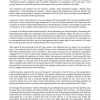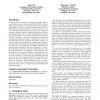28 search results - page 4 / 6 » Learning to Sense Selectively in Physical Domains |
131
click to vote
WWW
2004
ACM
16 years 2 months ago
2004
ACM
The ability to determine what day-to-day activity (such as cooking pasta, taking a pill, or watching a video) a person is performing is of interest in many application domains. A ...
129
click to vote
LREC
2010
15 years 3 months ago
2010
Existing approaches to classifying documents by sentiment include machine learning with features created from n-grams and part of speech. This paper explores a different approach ...
100
click to vote
UM
2009
Springer
15 years 8 months ago
2009
Springer
Abstract. The vast amount of information presented in museums is often overwhelming to a visitor, making it difficult to select personally interesting exhibits. Advances in mobile...
128
click to vote
DOLAP
2007
ACM
15 years 6 months ago
2007
ACM
ss domain. Using this more abstract approach means that more data sources of varying types can be incorporated with less effort, and such heterogeneous data sources might be very r...
133
click to vote
ATAL
2008
Springer
15 years 4 months ago
2008
Springer
In this paper, we investigate multi-agent learning (MAL) in a multi-agent resource selection problem (MARS) in which a large group of agents are competing for common resources. Si...


